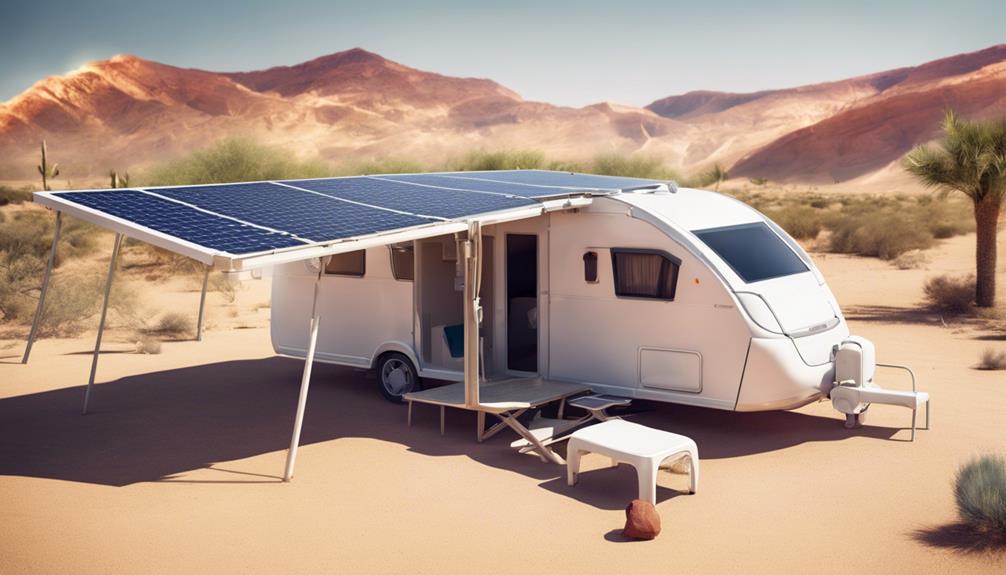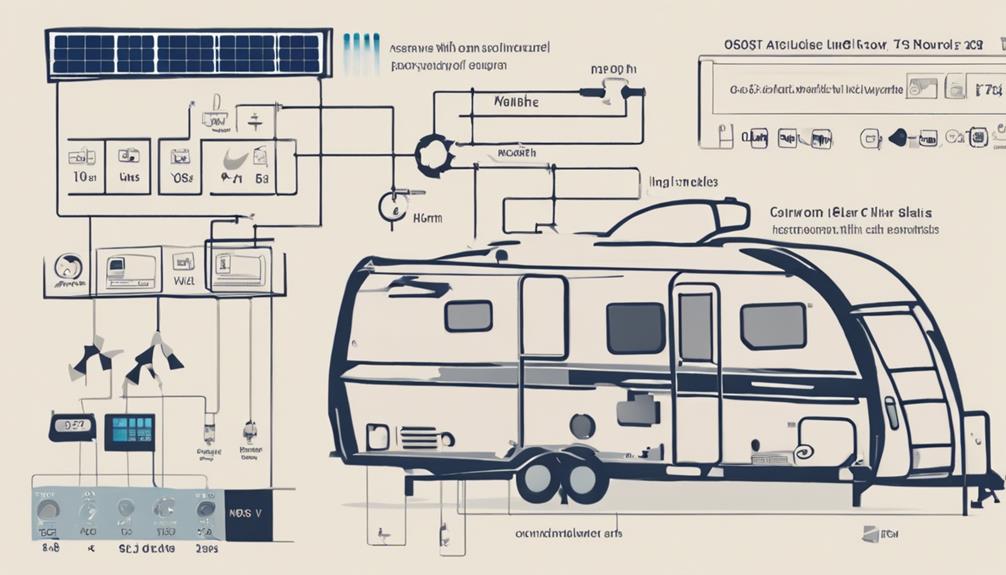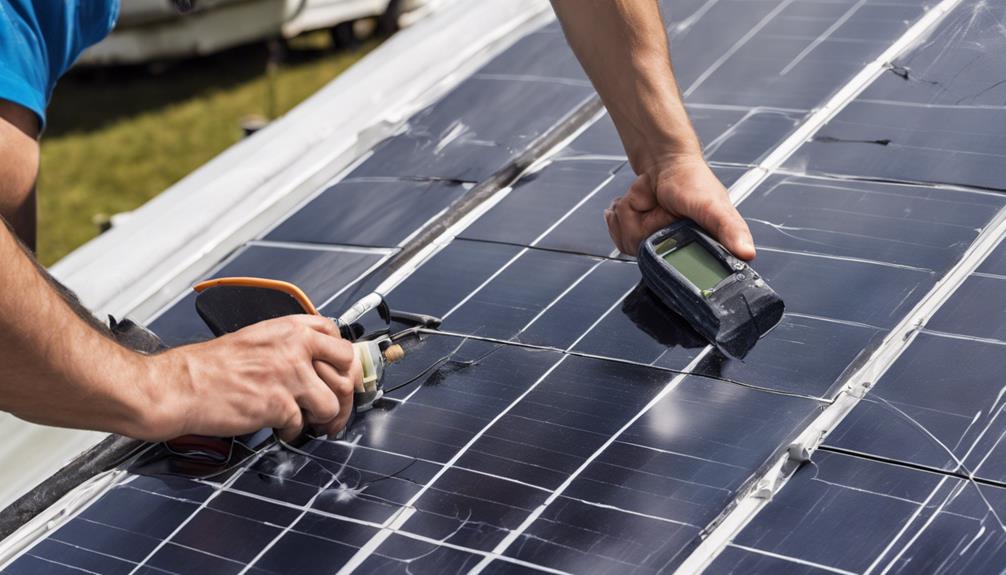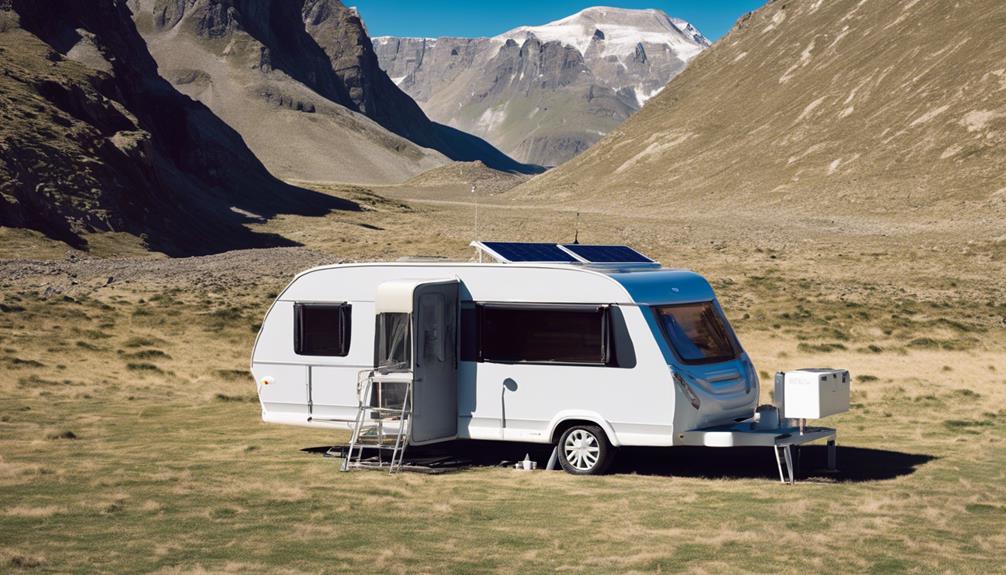When setting up solar panels for your caravan, grasp how efficient monocrystalline panels convert sunlight, choose the right size to match your energy demands, install them strategically for ideal sun exposure, and maintain them properly for lasting power while traveling.
How Solar Panels Work

Solar panels transform sunlight into electricity through the photovoltaic effect. When sunlight strikes the solar panels, the energy from the photons in the light is absorbed by the silicon cells within the panel. This absorption knocks electrons loose from their atoms, allowing them to flow through the material to generate electricity. This process is the foundation of solar energy generation and is vital for harnessing renewable power sources.
Once the electrons are set in motion by the absorbed sunlight, they create an electric current that can be captured and converted into usable electricity for your caravan.
This direct current (DC) electricity generated by the solar panels is then sent to an inverter, which converts it into alternating current (AC) electricity that can power your appliances on the go.
Understanding how solar panels work is necessary for maximizing the benefits of solar energy and utilizing renewable power efficiently in your caravan setup. By harnessing the photovoltaic effect, you can enjoy a sustainable and eco-friendly power source wherever your travels take you.
Types of Solar Panels
Among the various types of solar panels available for caravan use, monocrystalline panels are widely recognized for their efficiency and space-saving design. When considering efficiency, monocrystalline panels outperform polycrystalline panels due to their higher power output per square foot.
Although monocrystalline panels tend to be more expensive upfront, they often provide a better long-term cost analysis by generating more energy over their lifespan.
In terms of environmental impact, monocrystalline panels have a lower carbon footprint compared to other panel types, making them a more sustainable choice. Additionally, their durability factors are impressive, with most manufacturers offering warranties ranging from 25 to 30 years.
Monocrystalline panels are known for their resistance to harsh weather conditions, ensuring they can withstand the rigors of caravan travel. When considering efficiency comparison, cost analysis, environmental impact, and durability factors, monocrystalline panels emerge as a top choice for caravan solar systems.
Sizing Your Solar System

Determining the appropriate size for your caravan solar system involves calculating your energy consumption needs and considering factors such as available space for installation and sunlight exposure. To start, assess your power needs by listing all the electrical appliances you plan to use in your caravan, along with their power consumption in watts per hour. This will help you estimate the daily energy requirement of your system.
When it comes to solar panel placement, make sure that the panels receive maximum sunlight exposure throughout the day. Consider budget considerations by balancing the cost of the system with the energy efficiency it provides. Opt for high-quality solar panels that offer better efficiency ratings to maximize the energy output within the available space.
Installation Tips and Tricks
When setting up your caravan solar panels, make sure that you securely fasten each panel to the mounting brackets to prevent any movement or damage during travel.
Whether you choose to install your solar panels on the ground or on the roof of your caravan depends on your specific needs. Roof installations are a popular choice as they utilize the available space efficiently and keep the panels out of the way during travel.
However, ground installations provide the flexibility of being able to adjust the angle of the panels throughout the day to maximize sun exposure.
For those looking for flexibility, portable solar panel options are available. These panels can be easily set up and moved around to capture the most sunlight, making them ideal for campers who frequently change their parking spot or for those who want the option of using solar power outside of their caravan.
Remember to choose a portable option that's durable and weather-resistant for long-lasting use on your outdoor adventures.
Maintenance and Troubleshooting

To guarantee peak performance and longevity of your caravan solar panels, regular maintenance and troubleshooting are key aspects to take into account. Keeping your solar panels clean is essential for best efficiency. Use a soft cloth or sponge with mild soap and water to gently wipe away any dirt, dust, or debris that may accumulate on the panels. Avoid using abrasive materials that could scratch the surface and reduce the panel's effectiveness.
In addition to cleaning, monitoring your battery is necessary for ensuring your solar panels are functioning correctly. Regularly check the battery's charge level and voltage to prevent overcharging or deep discharges, which can harm the battery and decrease its lifespan. Utilize a battery monitor to keep track of the battery's health and performance.
Frequently Asked Questions
Can Solar Panels Charge My Caravan Battery While Driving?
Yes, solar panels can charge your caravan battery while driving. Solar panel efficiency impacts the charging rate, so make sure you have high-performance panels. Utilize a solar charge controller to regulate charging while driving for best battery health.
Are Flexible Solar Panels Suitable for All Weather Conditions?
Flexible solar panels are suitable for all weather conditions due to their waterproof durability and temperature resilience. They can withstand rain, snow, and varying temperatures, making them a reliable option for your caravan's energy needs.
Can I Connect Multiple Solar Panels to Increase Power Output?
Yes, you can connect multiple solar panels to increase power output. This method enhances solar panel efficiency by harnessing more sunlight. Guarantee proper wiring techniques, such as series or parallel connections, to optimize energy production and meet your caravan's power needs.
Do I Need a Regulator for My Solar Panel System?
You need a regulator for your solar panel system to guarantee peak performance and prevent overcharging. Regulators are essential for maintaining solar panel efficiency by regulating the voltage and current flow from the panels.
Can I Use Solar Panels to Power My Air Conditioning in a Caravan?
You cannot use solar panels alone to power air conditioning in a caravan due to high power consumption. Solar panel efficiency is limited for such heavy loads. Consider a hybrid system with batteries or a generator for sufficient power.
Conclusion
To sum up, understanding caravan solar panels is crucial for harnessing renewable energy while on the road. By grasping how solar panels operate, the various options accessible, sizing your system accurately, installing correctly, and maintaining regularly, you can secure a dependable and effective power source for your caravan.
Remember to address any problems that may occur to maintain your solar panels working optimally. With the appropriate knowledge and attention, you can relish the advantages of solar power wherever your travels take you.
